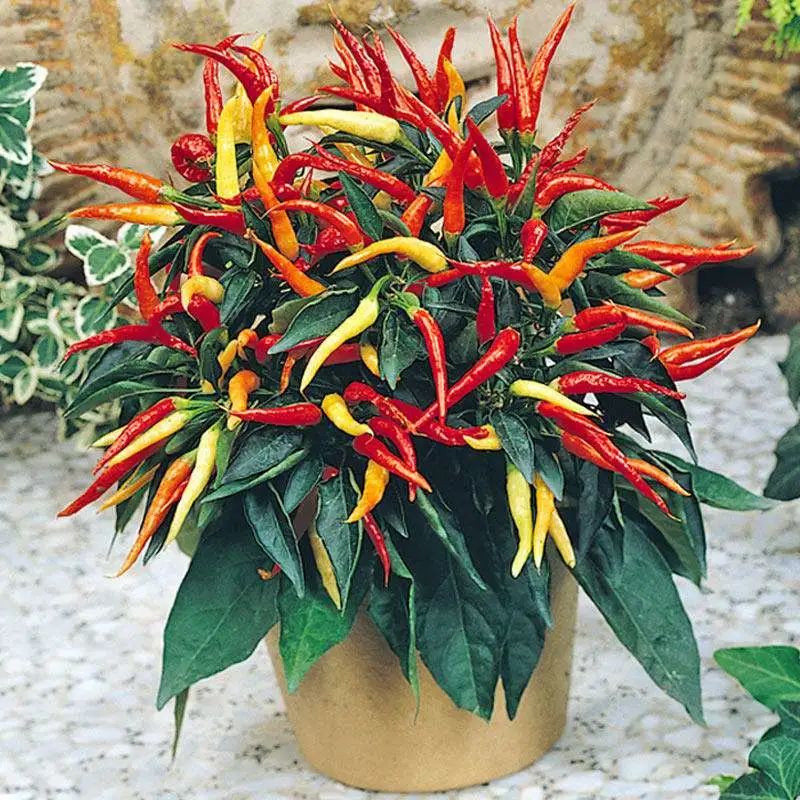新湖畔网 (随信APP) | 为什么刘备、关羽和张飞在蜀地呆了这么久却从未尝试过麻辣火锅呢?

新湖畔网 (随信APP) | 为什么刘备、关羽和张飞在蜀地呆了这么久却从未尝试过麻辣火锅呢?
【微信/公众号/视频号/抖音/小红书/快手/bilibili/微博/知乎/今日头条同步报道】
不管是中國內地的川菜,尤其是全世界都有的“麻婆豆腐”和老乾媽,還是西北的牛肉拉麵,或者西域名菜拉條子(拌麵)、大盤雞,都離不開辣椒。中華吃的文化,辣椒起碼要撐起半壁江山。
有椒其香-《詩經》。不過,這裡的椒,是花椒。那時,中國還真沒有辣椒。
中國歷史文獻中第一次出現辣椒的記載,已經是1591年明朝的《遵生八箋》。有趣的是,在這個最早的記載中,辣椒主要不是用來吃的,而是用來欣賞的:“番椒叢生,白花,果俨似秃筆頭,味辣色紅,甚可觀”。
又過了100多年,18世紀中期,在四川文人李化楠所撰的著名飲食專著《醒園錄》裡,還根本沒有一絲一毫辣椒的痕跡,可見直到那時,川菜裡面基本上也是看不見辣椒的。
估計那時辣椒還長在文人雅士的花園裡,主要是用來“觀”的。大概這樣:
一直到嘉慶、道光年間,也就是19世紀,有關地方誌才終於出現辣椒“種以為蔬”,“無椒芥不下箸也,湯則多有之”,“擇其極辣者,且每飯每菜,非辣不可”這樣的描述,表明辣椒終於成為蔬菜的一種,走向中國百姓的餐桌。
附帶說一下:道光年間的1840年,鴉片戰爭爆發。中國史學意義上的“近代史”就是從這裡開始的。可見中國人開始大規模種辣椒、吃辣椒,基本上是近代的事情。
遠在三國時期的劉關張,沒有一起吃過一次麻辣火鍋,那就是必然的了。
辣椒起源於美洲-迄今墨西哥還是辣椒生產和消費第二大國(第一當然是中國了),後來被哥倫布帶去歐洲,這是沒有問題的,有確鑿的歷史證據。但是,很多植物、果蔬傳入中國的時間和路徑相對比較清楚,但辣椒到底怎麼傳進中國,其實迄今還是個謎,沒有定論呢。下面是幾種說法。
有人認為:可能跟別的很多東西一樣是通過陸上絲綢之路,從中亞傳來的?但是時間對不上:中亞出現辣椒的記載只有300多年,比《遵生八箋》還晚。從中國傳過去還差不多。地點也對不上,後面要說到。
後來有人說:要不真是從日本乃至韓國傳來的?那更不對:日韓出現辣椒的記載更晚得多,從中國傳過去的可能性也還更大些。
重新注意一下就會發現,1591年寫《遵生八箋》的高濂,住在當時的“錢塘”,就是現在杭州市內。
此後不久,廣東等地的一些民間記錄也開始出現辣椒的有關記載。
所以,比較靠譜的路徑,可能真的是這個“海路傳入”說:當時與中國東南沿海通商的外國商人,從歐洲經由馬來西亞等地,把辣椒帶到了中國。馬來西亞是當時中國與歐洲海上通商的中轉樞紐,辣椒的出現也確實更早一些。這麼低價值的東西,從歐洲販運過來似乎不大合算,但是從馬來西亞等南亞地區帶過來,似乎就合理得多。目前這一派的觀點佔上風。
中國現在已經是辣椒的種植、消費第一大國,辣椒還承載了諸如“不吃辣的不革命”、潑辣的小姐姐叫“小辣椒”等的中國文化內涵。但是,它最早是地地道道的舶來“洋貨”,而且在近代才進入和豐富了中華文化,卻是沒有問題的。
來源:不老的榕樹 微信號:LAORONG_6688
#劉關張在蜀地待了那麼久為什麼沒有吃過一次麻辣火鍋
英文版:
Whether it's Sichuan cuisine from the mainland, the globally ubiquitous "Mapo Tofu," Laoganma, Northwestern beef noodle soup, or the Xinjiang specialty Lamian (hand-pulled noodles) and Big Plate Chicken, they all rely on chili peppers. The culinary culture of China, at least to some extent, revolves around chili peppers.
"Where there are peppers, there is fragrance" - Book of Songs. However, the "pepper" mentioned here refers to Sichuan peppercorns. Back then, China didn't actually have chili peppers.
The first recorded mention of chili peppers in Chinese historical documents dates back to 1591 in the Ming Dynasty's "Zunsheng Bajian." Interestingly, in this earliest account, chili peppers were mainly meant for admiration rather than consumption: "The pepper plants grow thickly, with white flowers, and the fruits resemble a bald pen nib, with a spicy taste and red color, very suitable for viewing."
Over 100 years later, in the mid-18th century, there is no trace of chili peppers in the famous gastronomic work "Xingyuanlu" by Li Huanan, a literati from Sichuan, showing that up to that point, chili peppers were not commonly used in Sichuan cuisine.
It is estimated that during that time, chili peppers were still growing in the gardens of literati and were mainly for "viewing." Probably something like this:
It wasn't until the Jiaqing and Daoguang eras, in the 19th century, that local chronicles finally mentioned chili peppers being "grown as vegetables," "one cannot eat without chili peppers, and there are many in soups," and "the spiciest selections, required for every meal and dish, are indispensable." This indicates that chili peppers had finally become a vegetable and made their way to the tables of the Chinese people.
As a side note: in the Daoguang era of 1840, the Opium War broke out. Modern Chinese history began from that point onwards. It can be seen that the extensive cultivation and consumption of chili peppers by the Chinese population was essentially a modern development.
It is a given that during the Three Kingdoms period, Liu Bei, Guan Yu, and Zhang Fei never sat down to enjoy a spicy hotpot together.
Chili peppers originated in the Americas - to this day, Mexico remains the second-largest producer and consumer of chili peppers (with China being the largest). Later, chili peppers were brought to Europe by Columbus, which is historically documented. However, although the time and path of other plants and vegetables entering China are relatively clear, the exact way chili peppers made their way into China remains a mystery to this day, without a definitive conclusion. Here are a few theories.
Some believe: Perhaps, like many other things, they entered through the overland Silk Road from Central Asia? But the timeline doesn't match: the record of chili peppers appearing in Central Asia is only around 300 years ago, which is later than the "Zunsheng Bajian." It wouldn't have arrived in China much earlier either. The location doesn't match either, as we'll discuss below.
Later, some suggested: What if it was brought from Japan or even Korea? This is even less likely: the records of chili peppers in Japan and Korea are much later, making it more plausible that they were passed on from China.
On closer examination, it is noted that Gao Lian, who wrote the "Zunsheng Bajian" in 1591, lived in the then "Qiantang," which is present-day Hangzhou.
Soon after, some folk records from Guangdong and other places began documenting chili peppers.
Therefore, the most plausible route might really be the "sea route transmission" theory: foreign merchants trading with China along the southeastern coast at that time, brought chili peppers from Europe via Malaysia and other places. Malaysia was a key hub for maritime trade between China and Europe at the time, and the appearance of chili peppers there was indeed earlier. Transporting such a low-value item from Europe directly seemed unprofitable, but bringing it from places like Malaysia in South Asia made more sense. This viewpoint is currently predominant.
China is now the largest producer and consumer of chili peppers, and chili peppers carry cultural connotations such as "those who don't eat spicy won't start a revolution" and fiery young ladies are referred to as "little chili peppers".... in Chinese culture. However, it was originally a genuine foreign "import," and it only entered and enriched Chinese culture in modern times, which is without a doubt.
Source: Aging Rongshu WeChat: LAORONG_6688
刘关张在蜀地呆了那么久,为什么没有吃过一次麻辣火锅?
#刘关张在蜀地呆了那么久为什么没有吃过一次麻辣火锅
关注流程:打开随信App→搜索新湖畔网随信号:973641 →订阅即可!
公众号:新湖畔网 抖音:新湖畔网
视频号:新湖畔网 快手:新湖畔网
小红书:新湖畔网 随信:新湖畔网
百家号:新湖畔网 B站:新湖畔网
知乎:新湖畔网 微博:新湖畔网
UC头条:新湖畔网 搜狐号:新湖畔网
趣头条:新湖畔网 虎嗅:新湖畔网
腾讯新闻:新湖畔网 网易号:新湖畔网
36氪:新湖畔网 钛媒体:新湖畔网
今日头条:新湖畔网 西瓜视频:新湖畔网




